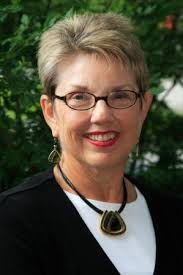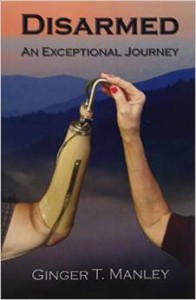Interview with Ginger Manley
Interview with Ginger Manley, author of Disarmed
Ginger Manley did not discover she wanted to be a writer until she was in her fifties. Before that she was a registered nurse and advance practice nurse, a certified sex therapist, a wife, mother, and almost completely normal person. Once she was taken under the spell of writing she has not been able to stop telling stories, inspired by a collection of vintage aprons she inherited, the antics of her grandchildren and other family members, the questions asked about sexuality by her students and readers, and now the lifelong story of her relationship with her husband, John, and his artificial arm.
under the spell of writing she has not been able to stop telling stories, inspired by a collection of vintage aprons she inherited, the antics of her grandchildren and other family members, the questions asked about sexuality by her students and readers, and now the lifelong story of her relationship with her husband, John, and his artificial arm.
When she is not writing, she works part-time at Vanderbilt University Medical School, teaching whoever will listen about sexuality, health care, and ethical practices for today’s doctors and nurses. In her free time, she is an avid gardener of her one-acre home place in Franklin, TN, where she composts anything that is biodegradable. She plays an occasionally decent round of golf but mostly sees the game as a vehicle for friendly associations with buddies in beautiful settings followed by food and drink. She, John, and the arm travel widely when given the opportunity to do so and are looking forward to whatever life journeys await them in the last couple decades of their lives.
MJT: Ginger, congratulations on the success of your inspirational memoir. While your story was fifty years in the making, it appears the actual writing of it took five years. What was your writing process during this period?
GM: Starts and stops. At first I intended to gather all the funny stories and publish just them. Then I realized I needed a context for the stories and that would require digging deeper and telling more of our story. I hit resistance from within and without on several occasions and just had to let the whole thing sit and fester. I finally decided to finish it in the long winter of 2014-2015 out of a sense of “how long do we have” and because the territory kept changing and I needed to get the book out before much of it was irrelevant.
 MJT: In Disarmed you describe how this relationship almost never got off the ground. You refer to John, your future husband, as “an annoying American.” Could you elaborate on exactly what was such a turnoff?
MJT: In Disarmed you describe how this relationship almost never got off the ground. You refer to John, your future husband, as “an annoying American.” Could you elaborate on exactly what was such a turnoff?
GM: I had fled the US for Europe in April of 1967 after several friends had had whirlwind romances and sudden marriages and I did not feel ready for that. I enjoyed freedom and anonymity in Europe and especially loved the connection with Europeans who did not judge me harshly for being American–this was the era of The Ugly American. Also, I was on the rebound from a failed relationship with an American naval aviator named John, and I was having none of that as a repeat performance. So I was armed and dangerous regarding American men, especially pilots named John.
MJT: Do you remember your first thoughts when you noticed John’s artificial hand?
GM: I was curious. I’d never seen or touched a prosthesis and somehow I associated it with allure and sexiness. The fact that he was wearing it probably also increased my finding it attractive.
MJT: You experienced some very hard times in the early years of your marriage. There were business failures, periods of joblessness, once you had to sell most of your possessions, and while you never lived on the street you did need to depend on family for temporary housing. What got you and John through these incredibly difficult times?
GM: Sometimes I wondered if we would get through, but we both had very strong personality traits of confidence and perseverance. There were a number of years when we were just too poor to consider living apart and we had two children to raise. And for me, I was determined to see us get to the other side, whatever that would look like. I think he always loved me, but it took me quite a while for me to get from lust and then tolerance to really loving him. That required acceptance of my own part of our problems and truly seeing him doing the best he could do. The biggest shift occurred on my 40th birthday when I realized he had stopped–for the most part–taking me for granted. At that point I could begin to let go of my anger.
MJT: When I reviewed Disarmed I referred to it as a memoir, but it is also much more. What was your objective when you started writing it?
GM: I wanted to get the funny stories altogether in one place. Then I wanted to set the record straight about what happened in his accident. I learned there were very many versions of the story because he had always refused to talk about it, creating a mystery that developed legs. Finally, I wanted to share our story with whomever cared to know why and how we got through all this. I think it is a lovely and maybe inspirational tale.
MJT: You write near the end of your book about an emotional reaction to a scene in Zac Efron’s film, Parkland. Could you tell us what was going through your mind at the time?
GM: When I began watching Parkland I was only focused on the drama of that day and on seeing if I could recall from my Parkland work experiences any of the people portrayed in the film. I was completely unprepared for my visceral reaction to the depiction of Mrs. Kennedy offering to Nurse Nelson the part of her husband’s brain she had cradled in her hands. In that scene I became Mrs. Kennedy holding part of John’s brain and I wept uncontrollably. After standing away from the film, I was able to also take in the irony of the Kennedy experience, my later working there, and the recent experience of Lauren Scruggs, who experienced an accident almost the same as John’s and who was treated at Parkland.
MJT: Both you and John are remarkable people. In Disarmed you give him the leading  role, with a strong supporting part for the artificial arm. His list of achievements is very impressive, and would be for anyone with or without a handicap. What is it about John that you are most proud of?
role, with a strong supporting part for the artificial arm. His list of achievements is very impressive, and would be for anyone with or without a handicap. What is it about John that you are most proud of?
GM: He never gets down or depressed and always keeps his sense of humor. He has persevered through two graduate programs that would challenge anyone and where he had to work twice as hard as almost anyone else but he completed them both and shined in the business field. He excels at living in the moment and he has loved me with a fierceness I cannot compute.
MJT: You are currently working on a novel. Tell us about it.
GM: Proud Flesh is the story of three women in their mid-fifties who form an unlikely friendship after meeting on an airplane when they were seated together in 1998. The protagonist is Dr. Carroll Murphy, a relentless California-based sex therapist who also teaches, researches, writes books, appears on TV talk shows, and basically never slows down enough to notice her absence of relationships. Trixie and Peggy are Tennessee cousins whose lives revolve around their family messes and who are enamored with Dr. Carroll’s celebrity status. Carroll has been estranged from her mother for nearly 40 years, while Trixie and Peggy are enmeshed with their mothers, even after the moms die. We follow these three ladies for six years as Carroll’s backstory begins to push through. In a poignant ending to which almost all women who came of age in the 1960’s and 1970’s can relate, Carroll’s story spills out in a most unlikely setting in Mt. Juliet, TN, in 2004, leading to tears of pain and of joy for all parties. Proud flesh is a very old country term for a wound that does not heal but instead keeps weeping through the skin, like if a cancer is underneath. The title encompasses all the wounds women of a certain age have experienced. I call Proud Flesh a novel of sex, God, and the redemptive power of flat-foot dancing. I wrote it because, as one of those later-life women, I find it difficult to relate to many novels where the characters have not lived past age fifty. Who knows anything at that age?
Ginger can be reached at ginger@gingermanley.com
Disarmed is available on Amazon.
Michael J. Tucker
Growing up in the cold northern climate of Pittsburgh, PA, and an only child, Mike was often trapped indoors and left to his own devices, where he would create space ships out of cardboard boxes, convert his mother’s ironing board into a horse and put on his Sunday suit and tie and his father’s fedora and become a newspaper reporter or police detective. This experience left him with an unlimited imagination and the ability to write electrifying short stories and novels.
Mike is the author of two critically acclaimed novels, Aquarius Falling and Capricorn’s Collapse. He has also published a collection of short stories entitled, The New Neighbor, and a poetry collection; Your Voice Spoke To My Ear. His poem, The Coyote’s Den, was included in the Civil War Anthology, Filtered Through Time.
He is a judge for the Janice Keck Literary Award, and the moderator of the Williamson County Library Writers’ Critique Group.
Reviewers of Mike’s novels have compared his writing to: Thomas Wolfe’s I Am Charlotte Simmons, and J. D. Salinger’s Catcher in the Rye. Albert Beckus, Professor Emeritus of Literature at Austin Peay University recently wrote of his novels: “They move naturalistically in the American literary tradition of Theodore Dreiser’s An American Tragedy, but with a twist…as found in The Great Gatsby.”
- Web |
- More Posts(22)